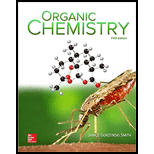
PKG ORGANIC CHEMISTRY
5th Edition
ISBN: 9781259963667
Author: SMITH
Publisher: MCG
expand_more
expand_more
format_list_bulleted
Concept explainers
Question
Chapter 31, Problem 31.37P
Interpretation Introduction
(a)
Interpretation: The three dimensional structure for the given steroid is to be drawn.
Concept introduction: In ball-and-stick model, each colored ball represents a specific atom and each stick represents a bond.
Interpretation Introduction
(b)
Interpretation: The structure of stereoisomer formed by the reduction of
Concept introduction: Ring-flipping converts equatorial bonds into axial bonds and axial bonds into equatorial bonds. The reduction of ketone into alcohol can be done by using reagent
Expert Solution & Answer
Trending nowThis is a popular solution!

Students have asked these similar questions
I'm having trouble with converting lewis diagrams into VSEPR diagrams. I currently have this example of C2BrCl3 which I want to turn into a lewis structure, but I'm not sure what steps I need to do in order to do so. I have the table written down, however, there's two central atoms so what would I do? There seems to be 4 electron domains on the carbon atom and no lone pairs so it would seem like this shape would be tetrahedral. Here's what I have now. Thanks!
We discussed the solid phase resin using in peptide synthesis. Provide a mechanism, for its formation. DRAW THE MECHANISM.
Please help. Every time I've asked an expert in the past, it's been wrong :(
Chapter 31 Solutions
PKG ORGANIC CHEMISTRY
Ch. 31 - Problem 31.1
One component of jojoba oil is a wax...Ch. 31 - Problem 31.2
How would you expect the melting...Ch. 31 - Problem 31.3
Draw the products formed when...Ch. 31 - Problem 31.4
The main fatty acid component of the...Ch. 31 - Prob. 31.5PCh. 31 - Problem 31.6
Draw the structure of a lecithin...Ch. 31 - Prob. 31.7PCh. 31 - Problem 31.8
Why are phospholipids, but not...Ch. 31 - Problem 31.9
Explain why regularly ingesting a...Ch. 31 - Problem 31.10
Locate the isoprene units in each...
Ch. 31 - Problem 31.11
Locate the isoprene units in...Ch. 31 - Problem 31.12
Write a stepwise mechanism for the...Ch. 31 - Prob. 31.13PCh. 31 - Prob. 31.14PCh. 31 - Prob. 31.15PCh. 31 - Prob. 31.16PCh. 31 - 31.17 Locate the isoprene units in each...Ch. 31 - Prob. 31.18PCh. 31 - Prob. 31.19PCh. 31 - Prob. 31.20PCh. 31 - Prob. 31.21PCh. 31 - 31.22 What is the structure of an optically...Ch. 31 - Prob. 31.23PCh. 31 - 31.24 Draw the structure of the following...Ch. 31 - Prob. 31.25PCh. 31 - Locate the isoprene units in each compound. a. e....Ch. 31 - 31.27 Classify each terpene and terpenoid in...Ch. 31 - 31.38 Draw the products formed when cholesterol is...Ch. 31 - 31.29 An isoprene unit can be thought of as having...Ch. 31 - 31.30 Draw a stepwise mechanism for the conversion...Ch. 31 - Prob. 31.31PCh. 31 - Prob. 31.32PCh. 31 - Draw three-dimensional structures f or each...Ch. 31 - Prob. 31.34PCh. 31 - Prob. 31.35PCh. 31 - Prob. 31.36PCh. 31 - Prob. 31.37PCh. 31 - 31.38 Draw the products formed when cholesterol is...Ch. 31 - 31.39 Draw a stepwise mechanism for the following...Ch. 31 - 31.40 Draw a stepwise mechanism for the following...Ch. 31 - Prob. 31.41P
Knowledge Booster
Learn more about
Need a deep-dive on the concept behind this application? Look no further. Learn more about this topic, chemistry and related others by exploring similar questions and additional content below.Similar questions
- Please help everysingle time ive asked in the past, the solution has been wrongarrow_forwardPlease helparrow_forward(a) 21.8 Name the following compounds. & (b) Br (e) O₂N. (h) H (c) Br (d) NH2 ☑N Br H ہیں Ph (g) OMe бл .0-0.e 21.9 Draw a structural formula for each compound. (a) 2,3-Dinitrotoluene (c) Diphenylmethanol (e) p-Nitroaniline (b) 3-Propylanisole (d) m-Propylphenol (f) Pentabromobenzenearrow_forward
- What will the enolate for this be using LDA, THF, and cold temperatures? What will it be using NaOEt at rt?arrow_forwardHelp me solve this problem.arrow_forwardDraw a mechanism for the following synthetic transformation including reagents and any isolable intermediates throughout the process. Please clearly indicate bond cleavage/formation using curly arrows. MeO2Carrow_forward
arrow_back_ios
SEE MORE QUESTIONS
arrow_forward_ios
Recommended textbooks for you
 Introductory Chemistry: An Active Learning Approa...ChemistryISBN:9781305079250Author:Mark S. Cracolice, Ed PetersPublisher:Cengage Learning
Introductory Chemistry: An Active Learning Approa...ChemistryISBN:9781305079250Author:Mark S. Cracolice, Ed PetersPublisher:Cengage Learning
 Introduction to General, Organic and BiochemistryChemistryISBN:9781285869759Author:Frederick A. Bettelheim, William H. Brown, Mary K. Campbell, Shawn O. Farrell, Omar TorresPublisher:Cengage Learning
Introduction to General, Organic and BiochemistryChemistryISBN:9781285869759Author:Frederick A. Bettelheim, William H. Brown, Mary K. Campbell, Shawn O. Farrell, Omar TorresPublisher:Cengage Learning Chemistry for Today: General, Organic, and Bioche...ChemistryISBN:9781305960060Author:Spencer L. Seager, Michael R. Slabaugh, Maren S. HansenPublisher:Cengage Learning
Chemistry for Today: General, Organic, and Bioche...ChemistryISBN:9781305960060Author:Spencer L. Seager, Michael R. Slabaugh, Maren S. HansenPublisher:Cengage Learning EBK A SMALL SCALE APPROACH TO ORGANIC LChemistryISBN:9781305446021Author:LampmanPublisher:CENGAGE LEARNING - CONSIGNMENT
EBK A SMALL SCALE APPROACH TO ORGANIC LChemistryISBN:9781305446021Author:LampmanPublisher:CENGAGE LEARNING - CONSIGNMENT

Introductory Chemistry: An Active Learning Approa...
Chemistry
ISBN:9781305079250
Author:Mark S. Cracolice, Ed Peters
Publisher:Cengage Learning


Introduction to General, Organic and Biochemistry
Chemistry
ISBN:9781285869759
Author:Frederick A. Bettelheim, William H. Brown, Mary K. Campbell, Shawn O. Farrell, Omar Torres
Publisher:Cengage Learning

Chemistry for Today: General, Organic, and Bioche...
Chemistry
ISBN:9781305960060
Author:Spencer L. Seager, Michael R. Slabaugh, Maren S. Hansen
Publisher:Cengage Learning

EBK A SMALL SCALE APPROACH TO ORGANIC L
Chemistry
ISBN:9781305446021
Author:Lampman
Publisher:CENGAGE LEARNING - CONSIGNMENT
